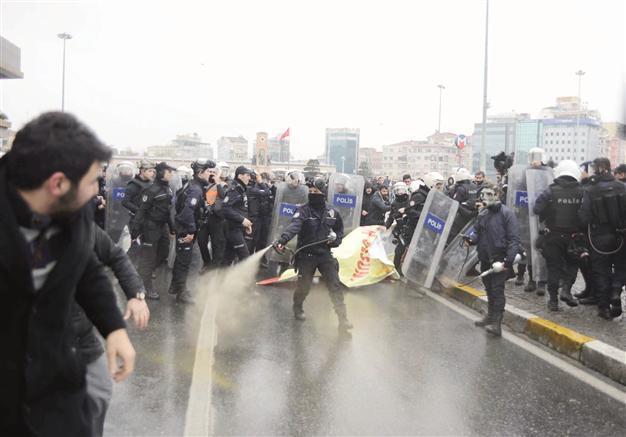Turkish government to give more rights to the police
Bülent Sarıoğlu ANKARA

DHA Photo
The Turkish government is set to increase the police’s authority by enlarging their rights on detention, use of weapons and wiretapping, along with 18 other topics, in a draft domestic order omnibus code that has been taken to Parliament.The draft bill suggests broadening governors’ authorities, while also amending the definition of firearms and changing the structure of the gendarmerie and coastguard.
If Parliament passes the omnibus bill, police will be able to detain people only on the grounds that they “jeopardize the safety of themselves or other individuals,” and will be able to respond with arms to Molotov cocktail attacks “until the attack is rendered ineffective.”
Law enforcement chiefs will have the right to decide for the detention of protestors without charge for up to 24 hours if they are seized in an “illegal demonstration,” while this period will be extended up to 48 hours if the demonstration becomes violent.
“Fireworks, Molotov cocktails and similar handmade arms” are to be included in the definition of firearms in the law, while “iron marbles and slingshots” have also been included in the list of instruments forbidden at protests.
Law enforcement officials will be allowed to wiretap and receive signal information for up to 48 hours without the permission of a judge in cases where delays would be critical. Only cases being overseen by an Ankara High Criminal Court judge will be able to be extended beyond the 48-hour limit. The time limit is currently 24 hours.
Provincial and district governors will be given the right to verbally assign a security chief to search a person or a car, and will need to seek the judge’s approval for this within 24 hours, according to the draft.
For maintaining the order and safety of society, governors will also be able to demand vehicles such as fire trucks, ambulances and construction vehicles from local authorities.
The police department and police academy will be reconstructed in the areas of education, promotion, appointments and dismissals, while the duties of the gendarmerie and coastguard forces will be split into military and non-military categories. Tasks that fall under the military category will be under the authority of the Chief of Staff, while non-military tasks will fall under the authority of the Interior Ministry. The general-admiral staff of the gendarmerie and coastguard forces will also come under the Interior Ministry.
















